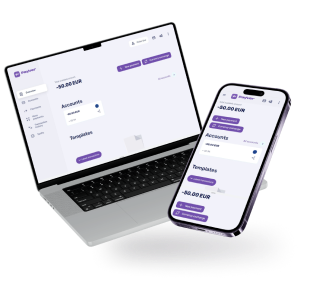International payments are the backbone of the global economy, but traditional methods often pose challenges, especially with the rapid development of digital technologies. Traditional methods, such as wire transfers, checks and correspondent banking, offer reliability but fall short of today's business requirements. They are slow, expensive and opaque.
Traditional methods: advantages and limitations
Bank transfers remain one of the most popular ways to make international payments. This method offers reliability and widespread availability, especially for large amounts. Wire transfers are suitable for various types of transactions, from payment for goods and services to transferring funds between banks. However, high fees and long processing times remain major problems. Funds can arrive in the recipient’s account several days after being sent, which can slow down business processes and inconvenience customers.
Bank checks and warrants, while providing a high level of security, are becoming less popular due to the inconvenience of using them. Check processing time can take several weeks, and the risk of loss or theft remains relevant. Additional fees for check collection make this method even less attractive in today’s world, where speed and efficiency are becoming key indicators of success.
Correspondent banks play an important role in facilitating international transfers, especially in countries with less developed financial infrastructure. A correspondent bank system allows transfers between different countries to be made through a network of intermediary banks. However, this multi-stage system can be slow and costly. Fees are charged at each stage of the transfer, making the process less transparent and increasing costs for businesses.
Problems of modern international payments
With the development of digital technologies and globalization, the requirements for international payments have changed significantly. Today, businesses need solutions that allow them to transfer funds quickly, securely and cost-effectively. Traditional methods often fail to meet these requirements, leading to the need to find new, more efficient ways of making payments.
One of these solutions was the creation of SEPA (Single Euro Payments Area), which greatly simplified and standardized euro transfers across Europe. The main goal of SEPA is to make international payments as easy as domestic payments. Several key instruments have been introduced within SEPA:
- SEPA Credit Transfer (SCT) is the standard for one-off transfers such as bill and salary payments.
- SEPA Instant Credit Transfer (SCT Inst) is a new tool that allows instant transfers of up to €100,000 at any time, 24/7/365.
- SEPA Direct Debit Core (SDD Core) is a system for automated recurring payments such as utility bills.
- SEPA Direct Debit Business-to-Business (SDD B2B) is the equivalent of SDD Core, customized for business needs.
While SEPA has greatly improved the process of international transfers in Europe, it has its limitations, especially outside the EU. In addition, businesses still need solutions that offer more flexible terms and the ability to work with different currencies.
To meet the needs of modern businesses, the Payver platform has been developed to overcome many of the limitations of traditional international payment methods. Payver offers fast, secure and cost-effective solutions for managing international transactions.
Speed and efficiency are key advantages of Payver. The platform supports instant payments, avoiding delays common to traditional methods. Companies can send and receive funds almost instantly, improving cash flow management and customer satisfaction.
Reliability and security are ensured by Payver’s compliance with the highest security standards, including PCI DSS Level 1 certification. This ensures that all transactions are protected from fraud and other threats.
Cost-effectiveness is achieved due to transparent pricing policy and absence of hidden commissions. Payver offers competitive exchange rates and low transaction fees, allowing businesses to minimize costs and improve their financial results.
With traditional international payment methods becoming increasingly irrelevant, Payver offers a modern solution that meets the demands for fast and secure transfer of funds across borders. This platform is ideal for businesses seeking global growth and efficient management of their financial flows.






